Case Study Assignment: Legal Implications of Exclusion Clauses
VerifiedAdded on 2022/11/16
|9
|2299
|423
Case Study
AI Summary
This case study analyzes the legal implications of exclusion clauses within the context of contract law, focusing on a scenario involving a TV shop's advertisement and a customer's attempt to purchase a television at a discounted price. It examines the formation of a contract, the nature of statements made during negotiations (terms versus representations), and the validity of an exclusion clause displayed by the shop. The analysis delves into the rules governing exclusion clauses, including the requirement of reasonable notice, previous transactions, and trade customs, in addition to the Unfair Terms in Consumer Contract Regulations 1999 and the Consumer Rights Act 2015. The case concludes that the shop is bound by its advertisement and cannot rely on the exclusion clause because it was not properly incorporated into the contract, thereby highlighting the importance of consumer rights and the legal ramifications of unfair contract terms. The study references relevant case law and legislation to support its conclusions.
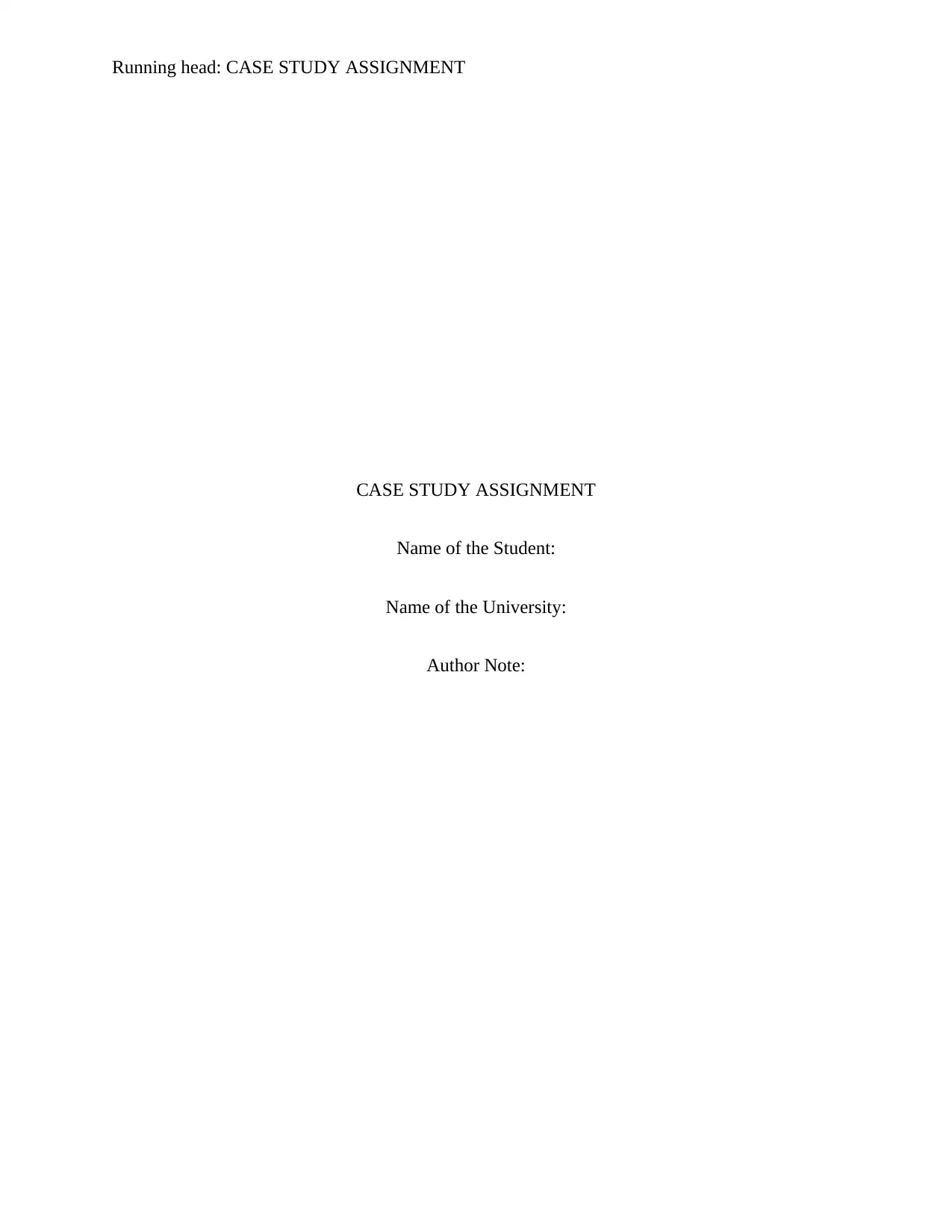
Running head: CASE STUDY ASSIGNMENT
CASE STUDY ASSIGNMENT
Name of the Student:
Name of the University:
Author Note:
CASE STUDY ASSIGNMENT
Name of the Student:
Name of the University:
Author Note:
Paraphrase This Document
Need a fresh take? Get an instant paraphrase of this document with our AI Paraphraser
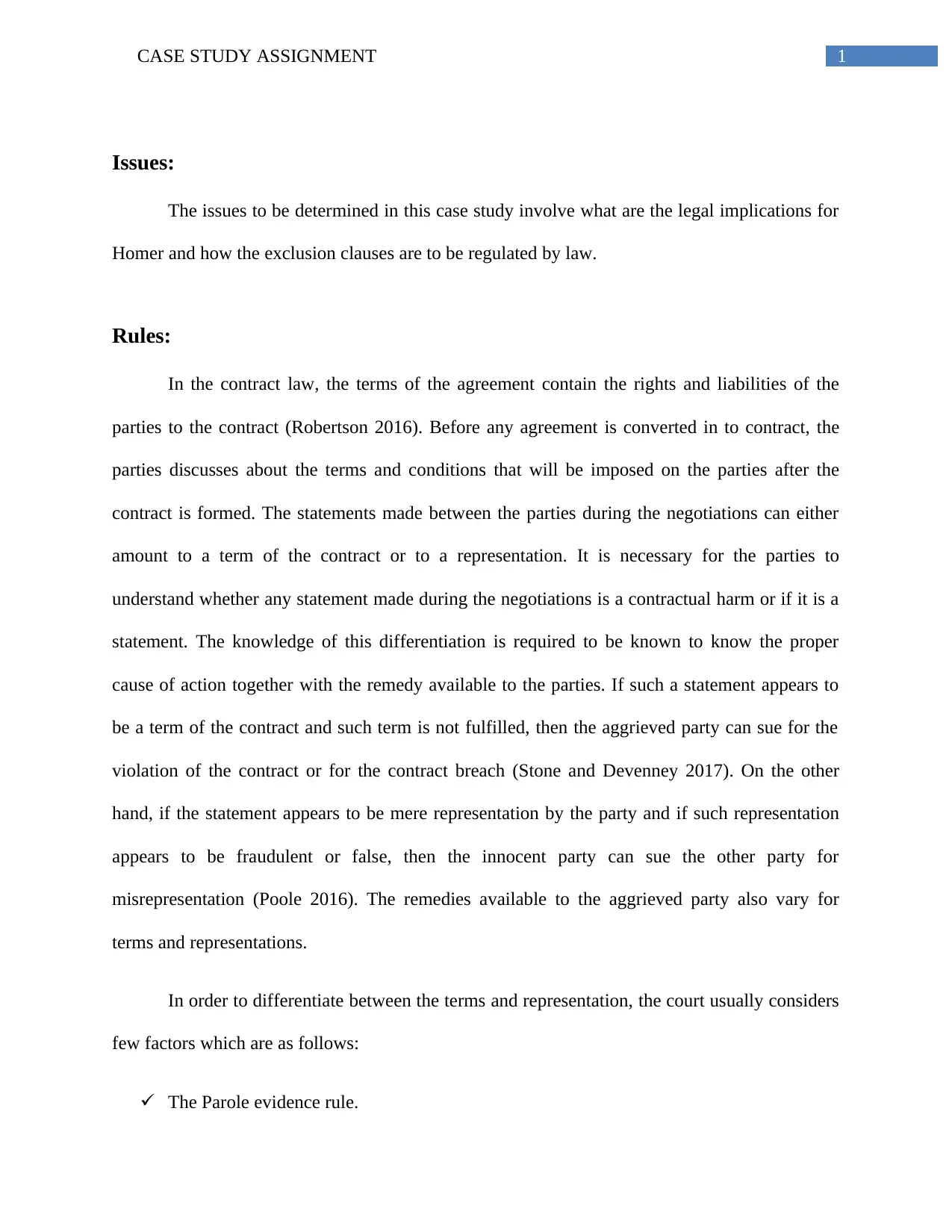
1CASE STUDY ASSIGNMENT
Issues:
The issues to be determined in this case study involve what are the legal implications for
Homer and how the exclusion clauses are to be regulated by law.
Rules:
In the contract law, the terms of the agreement contain the rights and liabilities of the
parties to the contract (Robertson 2016). Before any agreement is converted in to contract, the
parties discusses about the terms and conditions that will be imposed on the parties after the
contract is formed. The statements made between the parties during the negotiations can either
amount to a term of the contract or to a representation. It is necessary for the parties to
understand whether any statement made during the negotiations is a contractual harm or if it is a
statement. The knowledge of this differentiation is required to be known to know the proper
cause of action together with the remedy available to the parties. If such a statement appears to
be a term of the contract and such term is not fulfilled, then the aggrieved party can sue for the
violation of the contract or for the contract breach (Stone and Devenney 2017). On the other
hand, if the statement appears to be mere representation by the party and if such representation
appears to be fraudulent or false, then the innocent party can sue the other party for
misrepresentation (Poole 2016). The remedies available to the aggrieved party also vary for
terms and representations.
In order to differentiate between the terms and representation, the court usually considers
few factors which are as follows:
The Parole evidence rule.
Issues:
The issues to be determined in this case study involve what are the legal implications for
Homer and how the exclusion clauses are to be regulated by law.
Rules:
In the contract law, the terms of the agreement contain the rights and liabilities of the
parties to the contract (Robertson 2016). Before any agreement is converted in to contract, the
parties discusses about the terms and conditions that will be imposed on the parties after the
contract is formed. The statements made between the parties during the negotiations can either
amount to a term of the contract or to a representation. It is necessary for the parties to
understand whether any statement made during the negotiations is a contractual harm or if it is a
statement. The knowledge of this differentiation is required to be known to know the proper
cause of action together with the remedy available to the parties. If such a statement appears to
be a term of the contract and such term is not fulfilled, then the aggrieved party can sue for the
violation of the contract or for the contract breach (Stone and Devenney 2017). On the other
hand, if the statement appears to be mere representation by the party and if such representation
appears to be fraudulent or false, then the innocent party can sue the other party for
misrepresentation (Poole 2016). The remedies available to the aggrieved party also vary for
terms and representations.
In order to differentiate between the terms and representation, the court usually considers
few factors which are as follows:
The Parole evidence rule.
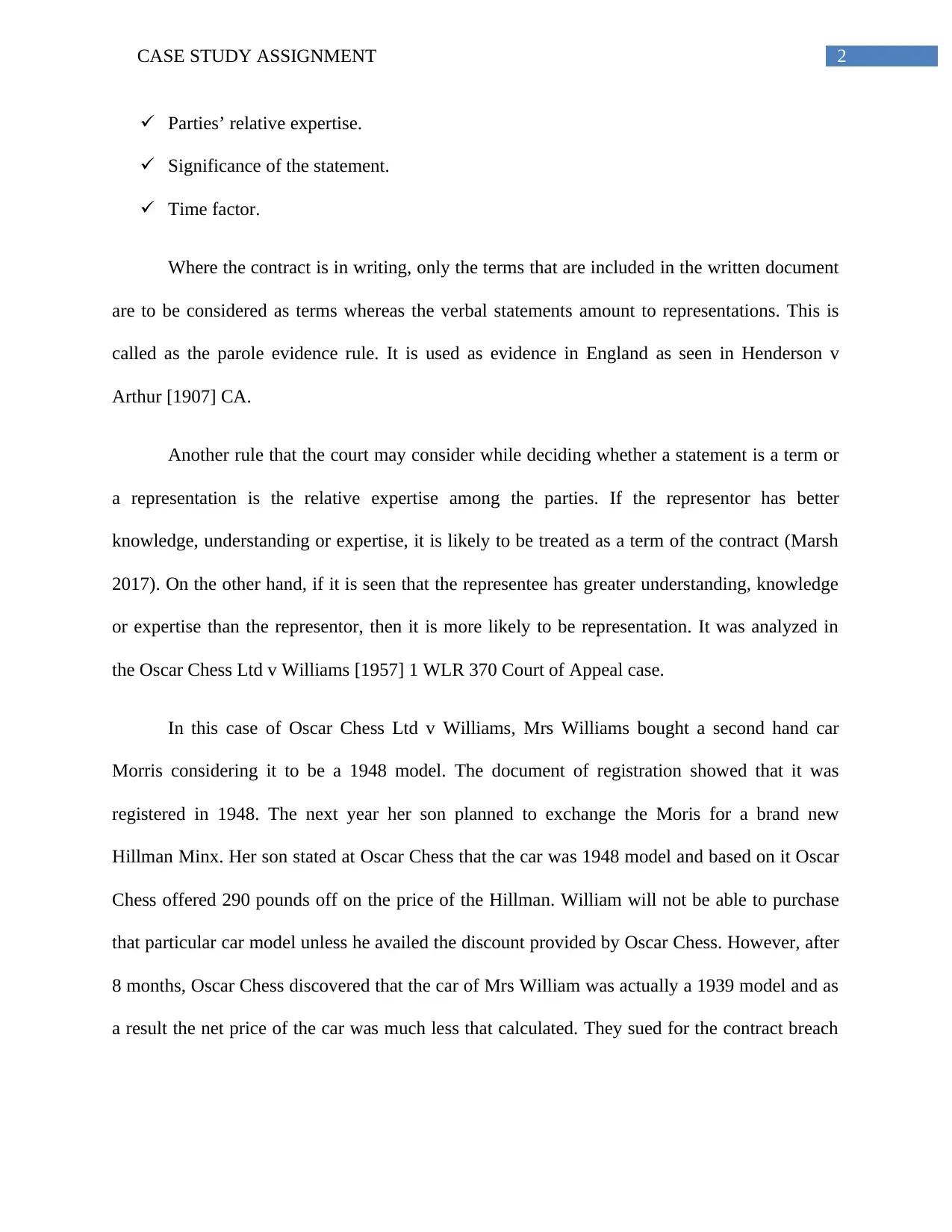
2CASE STUDY ASSIGNMENT
Parties’ relative expertise.
Significance of the statement.
Time factor.
Where the contract is in writing, only the terms that are included in the written document
are to be considered as terms whereas the verbal statements amount to representations. This is
called as the parole evidence rule. It is used as evidence in England as seen in Henderson v
Arthur [1907] CA.
Another rule that the court may consider while deciding whether a statement is a term or
a representation is the relative expertise among the parties. If the representor has better
knowledge, understanding or expertise, it is likely to be treated as a term of the contract (Marsh
2017). On the other hand, if it is seen that the representee has greater understanding, knowledge
or expertise than the representor, then it is more likely to be representation. It was analyzed in
the Oscar Chess Ltd v Williams [1957] 1 WLR 370 Court of Appeal case.
In this case of Oscar Chess Ltd v Williams, Mrs Williams bought a second hand car
Morris considering it to be a 1948 model. The document of registration showed that it was
registered in 1948. The next year her son planned to exchange the Moris for a brand new
Hillman Minx. Her son stated at Oscar Chess that the car was 1948 model and based on it Oscar
Chess offered 290 pounds off on the price of the Hillman. William will not be able to purchase
that particular car model unless he availed the discount provided by Oscar Chess. However, after
8 months, Oscar Chess discovered that the car of Mrs William was actually a 1939 model and as
a result the net price of the car was much less that calculated. They sued for the contract breach
Parties’ relative expertise.
Significance of the statement.
Time factor.
Where the contract is in writing, only the terms that are included in the written document
are to be considered as terms whereas the verbal statements amount to representations. This is
called as the parole evidence rule. It is used as evidence in England as seen in Henderson v
Arthur [1907] CA.
Another rule that the court may consider while deciding whether a statement is a term or
a representation is the relative expertise among the parties. If the representor has better
knowledge, understanding or expertise, it is likely to be treated as a term of the contract (Marsh
2017). On the other hand, if it is seen that the representee has greater understanding, knowledge
or expertise than the representor, then it is more likely to be representation. It was analyzed in
the Oscar Chess Ltd v Williams [1957] 1 WLR 370 Court of Appeal case.
In this case of Oscar Chess Ltd v Williams, Mrs Williams bought a second hand car
Morris considering it to be a 1948 model. The document of registration showed that it was
registered in 1948. The next year her son planned to exchange the Moris for a brand new
Hillman Minx. Her son stated at Oscar Chess that the car was 1948 model and based on it Oscar
Chess offered 290 pounds off on the price of the Hillman. William will not be able to purchase
that particular car model unless he availed the discount provided by Oscar Chess. However, after
8 months, Oscar Chess discovered that the car of Mrs William was actually a 1939 model and as
a result the net price of the car was much less that calculated. They sued for the contract breach
⊘ This is a preview!⊘
Do you want full access?
Subscribe today to unlock all pages.

Trusted by 1+ million students worldwide
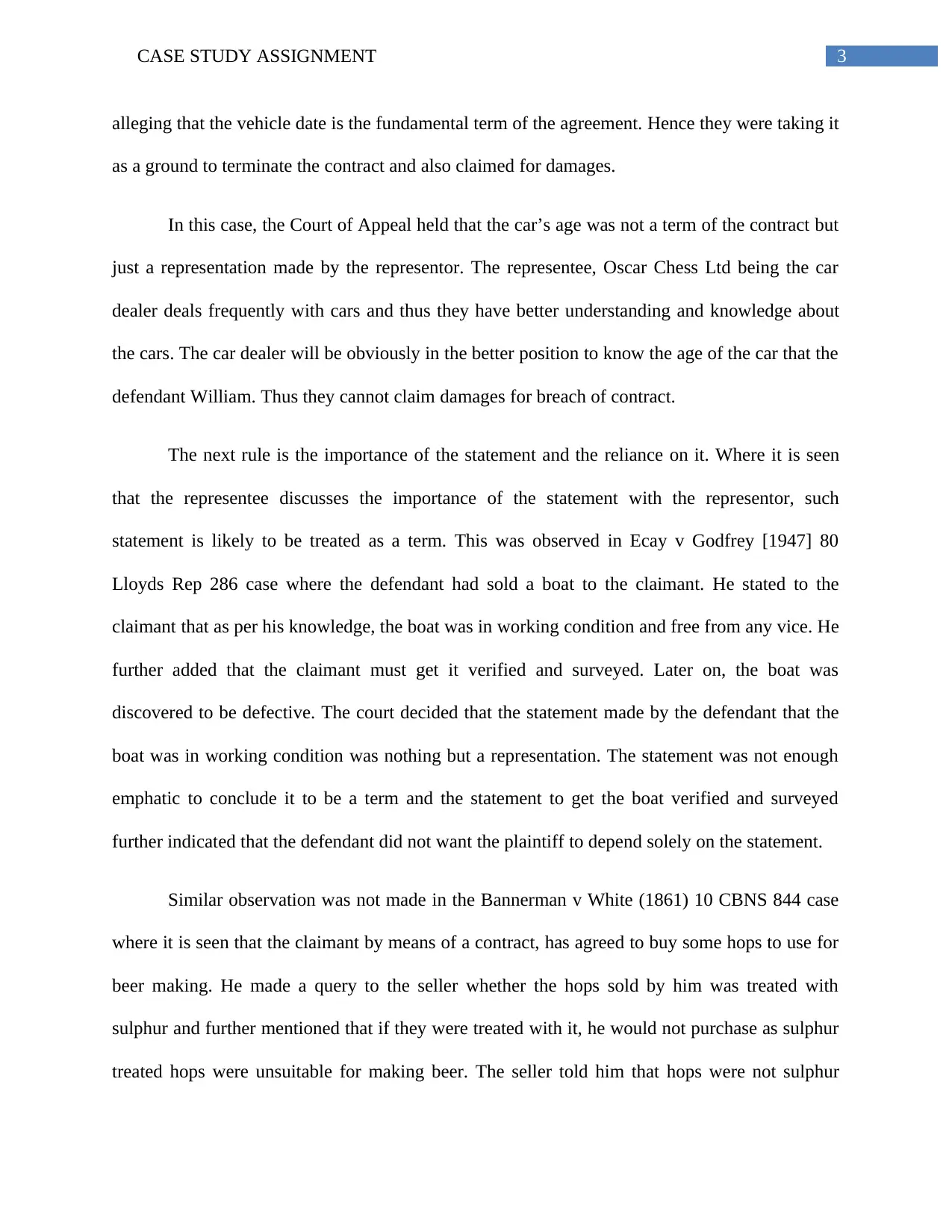
3CASE STUDY ASSIGNMENT
alleging that the vehicle date is the fundamental term of the agreement. Hence they were taking it
as a ground to terminate the contract and also claimed for damages.
In this case, the Court of Appeal held that the car’s age was not a term of the contract but
just a representation made by the representor. The representee, Oscar Chess Ltd being the car
dealer deals frequently with cars and thus they have better understanding and knowledge about
the cars. The car dealer will be obviously in the better position to know the age of the car that the
defendant William. Thus they cannot claim damages for breach of contract.
The next rule is the importance of the statement and the reliance on it. Where it is seen
that the representee discusses the importance of the statement with the representor, such
statement is likely to be treated as a term. This was observed in Ecay v Godfrey [1947] 80
Lloyds Rep 286 case where the defendant had sold a boat to the claimant. He stated to the
claimant that as per his knowledge, the boat was in working condition and free from any vice. He
further added that the claimant must get it verified and surveyed. Later on, the boat was
discovered to be defective. The court decided that the statement made by the defendant that the
boat was in working condition was nothing but a representation. The statement was not enough
emphatic to conclude it to be a term and the statement to get the boat verified and surveyed
further indicated that the defendant did not want the plaintiff to depend solely on the statement.
Similar observation was not made in the Bannerman v White (1861) 10 CBNS 844 case
where it is seen that the claimant by means of a contract, has agreed to buy some hops to use for
beer making. He made a query to the seller whether the hops sold by him was treated with
sulphur and further mentioned that if they were treated with it, he would not purchase as sulphur
treated hops were unsuitable for making beer. The seller told him that hops were not sulphur
alleging that the vehicle date is the fundamental term of the agreement. Hence they were taking it
as a ground to terminate the contract and also claimed for damages.
In this case, the Court of Appeal held that the car’s age was not a term of the contract but
just a representation made by the representor. The representee, Oscar Chess Ltd being the car
dealer deals frequently with cars and thus they have better understanding and knowledge about
the cars. The car dealer will be obviously in the better position to know the age of the car that the
defendant William. Thus they cannot claim damages for breach of contract.
The next rule is the importance of the statement and the reliance on it. Where it is seen
that the representee discusses the importance of the statement with the representor, such
statement is likely to be treated as a term. This was observed in Ecay v Godfrey [1947] 80
Lloyds Rep 286 case where the defendant had sold a boat to the claimant. He stated to the
claimant that as per his knowledge, the boat was in working condition and free from any vice. He
further added that the claimant must get it verified and surveyed. Later on, the boat was
discovered to be defective. The court decided that the statement made by the defendant that the
boat was in working condition was nothing but a representation. The statement was not enough
emphatic to conclude it to be a term and the statement to get the boat verified and surveyed
further indicated that the defendant did not want the plaintiff to depend solely on the statement.
Similar observation was not made in the Bannerman v White (1861) 10 CBNS 844 case
where it is seen that the claimant by means of a contract, has agreed to buy some hops to use for
beer making. He made a query to the seller whether the hops sold by him was treated with
sulphur and further mentioned that if they were treated with it, he would not purchase as sulphur
treated hops were unsuitable for making beer. The seller told him that hops were not sulphur
Paraphrase This Document
Need a fresh take? Get an instant paraphrase of this document with our AI Paraphraser
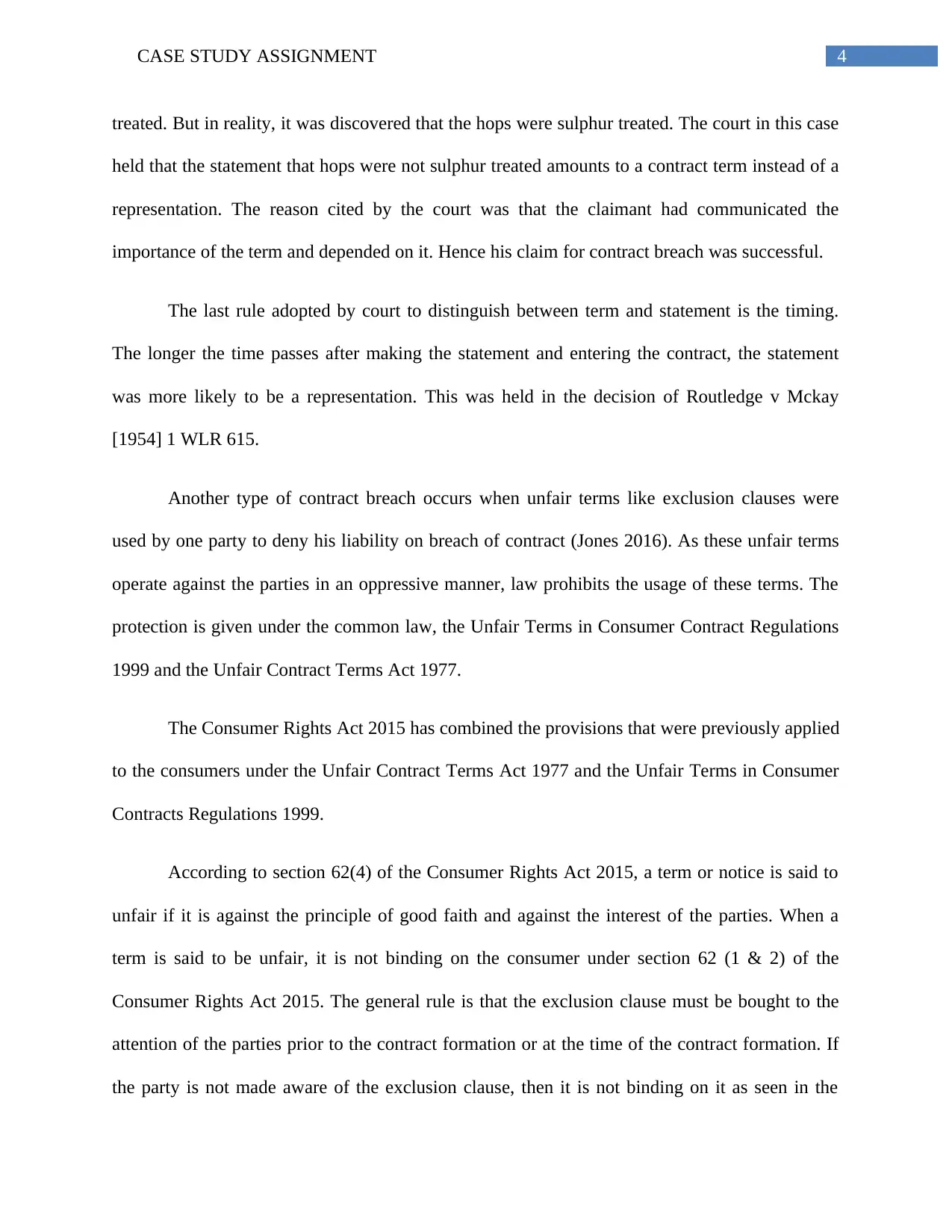
4CASE STUDY ASSIGNMENT
treated. But in reality, it was discovered that the hops were sulphur treated. The court in this case
held that the statement that hops were not sulphur treated amounts to a contract term instead of a
representation. The reason cited by the court was that the claimant had communicated the
importance of the term and depended on it. Hence his claim for contract breach was successful.
The last rule adopted by court to distinguish between term and statement is the timing.
The longer the time passes after making the statement and entering the contract, the statement
was more likely to be a representation. This was held in the decision of Routledge v Mckay
[1954] 1 WLR 615.
Another type of contract breach occurs when unfair terms like exclusion clauses were
used by one party to deny his liability on breach of contract (Jones 2016). As these unfair terms
operate against the parties in an oppressive manner, law prohibits the usage of these terms. The
protection is given under the common law, the Unfair Terms in Consumer Contract Regulations
1999 and the Unfair Contract Terms Act 1977.
The Consumer Rights Act 2015 has combined the provisions that were previously applied
to the consumers under the Unfair Contract Terms Act 1977 and the Unfair Terms in Consumer
Contracts Regulations 1999.
According to section 62(4) of the Consumer Rights Act 2015, a term or notice is said to
unfair if it is against the principle of good faith and against the interest of the parties. When a
term is said to be unfair, it is not binding on the consumer under section 62 (1 & 2) of the
Consumer Rights Act 2015. The general rule is that the exclusion clause must be bought to the
attention of the parties prior to the contract formation or at the time of the contract formation. If
the party is not made aware of the exclusion clause, then it is not binding on it as seen in the
treated. But in reality, it was discovered that the hops were sulphur treated. The court in this case
held that the statement that hops were not sulphur treated amounts to a contract term instead of a
representation. The reason cited by the court was that the claimant had communicated the
importance of the term and depended on it. Hence his claim for contract breach was successful.
The last rule adopted by court to distinguish between term and statement is the timing.
The longer the time passes after making the statement and entering the contract, the statement
was more likely to be a representation. This was held in the decision of Routledge v Mckay
[1954] 1 WLR 615.
Another type of contract breach occurs when unfair terms like exclusion clauses were
used by one party to deny his liability on breach of contract (Jones 2016). As these unfair terms
operate against the parties in an oppressive manner, law prohibits the usage of these terms. The
protection is given under the common law, the Unfair Terms in Consumer Contract Regulations
1999 and the Unfair Contract Terms Act 1977.
The Consumer Rights Act 2015 has combined the provisions that were previously applied
to the consumers under the Unfair Contract Terms Act 1977 and the Unfair Terms in Consumer
Contracts Regulations 1999.
According to section 62(4) of the Consumer Rights Act 2015, a term or notice is said to
unfair if it is against the principle of good faith and against the interest of the parties. When a
term is said to be unfair, it is not binding on the consumer under section 62 (1 & 2) of the
Consumer Rights Act 2015. The general rule is that the exclusion clause must be bought to the
attention of the parties prior to the contract formation or at the time of the contract formation. If
the party is not made aware of the exclusion clause, then it is not binding on it as seen in the
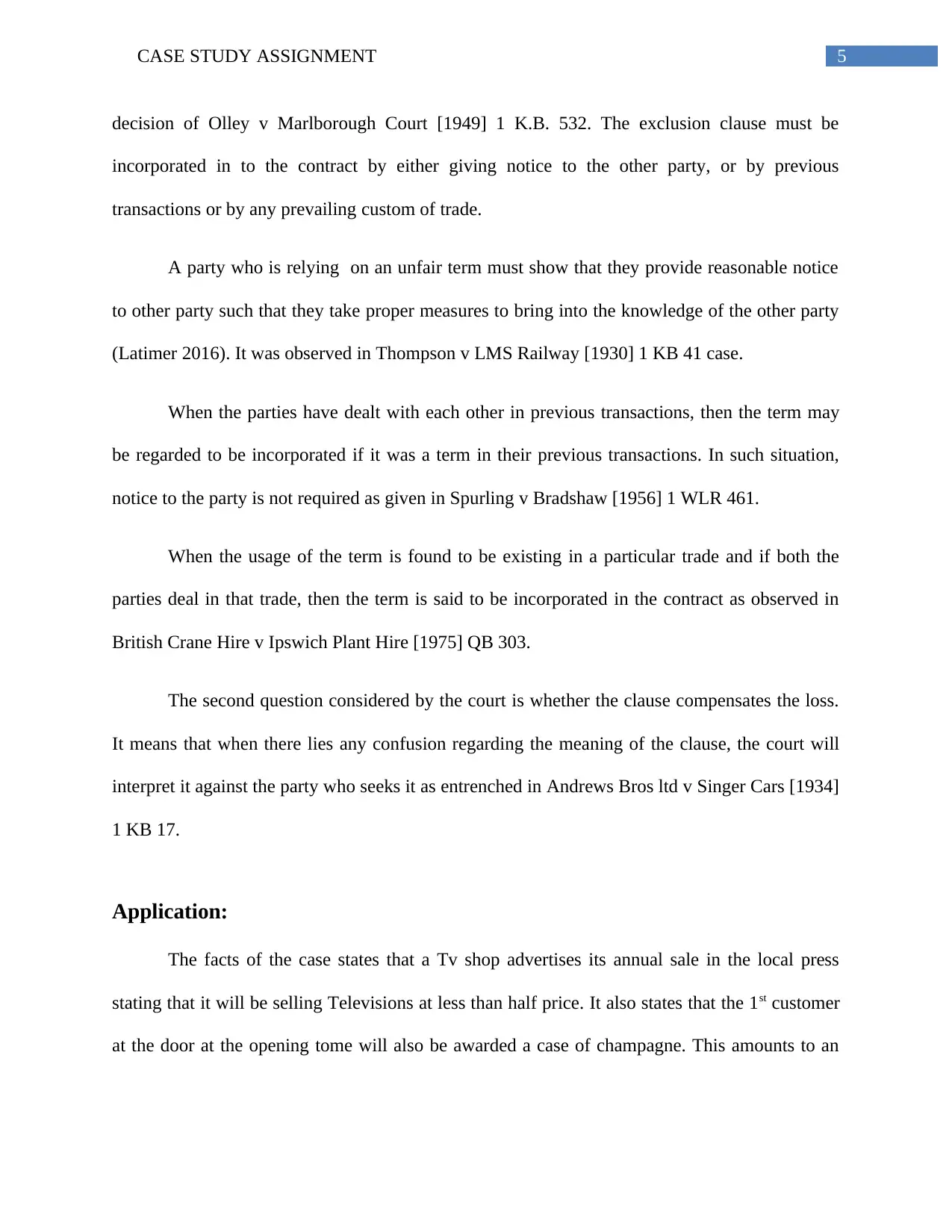
5CASE STUDY ASSIGNMENT
decision of Olley v Marlborough Court [1949] 1 K.B. 532. The exclusion clause must be
incorporated in to the contract by either giving notice to the other party, or by previous
transactions or by any prevailing custom of trade.
A party who is relying on an unfair term must show that they provide reasonable notice
to other party such that they take proper measures to bring into the knowledge of the other party
(Latimer 2016). It was observed in Thompson v LMS Railway [1930] 1 KB 41 case.
When the parties have dealt with each other in previous transactions, then the term may
be regarded to be incorporated if it was a term in their previous transactions. In such situation,
notice to the party is not required as given in Spurling v Bradshaw [1956] 1 WLR 461.
When the usage of the term is found to be existing in a particular trade and if both the
parties deal in that trade, then the term is said to be incorporated in the contract as observed in
British Crane Hire v Ipswich Plant Hire [1975] QB 303.
The second question considered by the court is whether the clause compensates the loss.
It means that when there lies any confusion regarding the meaning of the clause, the court will
interpret it against the party who seeks it as entrenched in Andrews Bros ltd v Singer Cars [1934]
1 KB 17.
Application:
The facts of the case states that a Tv shop advertises its annual sale in the local press
stating that it will be selling Televisions at less than half price. It also states that the 1st customer
at the door at the opening tome will also be awarded a case of champagne. This amounts to an
decision of Olley v Marlborough Court [1949] 1 K.B. 532. The exclusion clause must be
incorporated in to the contract by either giving notice to the other party, or by previous
transactions or by any prevailing custom of trade.
A party who is relying on an unfair term must show that they provide reasonable notice
to other party such that they take proper measures to bring into the knowledge of the other party
(Latimer 2016). It was observed in Thompson v LMS Railway [1930] 1 KB 41 case.
When the parties have dealt with each other in previous transactions, then the term may
be regarded to be incorporated if it was a term in their previous transactions. In such situation,
notice to the party is not required as given in Spurling v Bradshaw [1956] 1 WLR 461.
When the usage of the term is found to be existing in a particular trade and if both the
parties deal in that trade, then the term is said to be incorporated in the contract as observed in
British Crane Hire v Ipswich Plant Hire [1975] QB 303.
The second question considered by the court is whether the clause compensates the loss.
It means that when there lies any confusion regarding the meaning of the clause, the court will
interpret it against the party who seeks it as entrenched in Andrews Bros ltd v Singer Cars [1934]
1 KB 17.
Application:
The facts of the case states that a Tv shop advertises its annual sale in the local press
stating that it will be selling Televisions at less than half price. It also states that the 1st customer
at the door at the opening tome will also be awarded a case of champagne. This amounts to an
⊘ This is a preview!⊘
Do you want full access?
Subscribe today to unlock all pages.

Trusted by 1+ million students worldwide
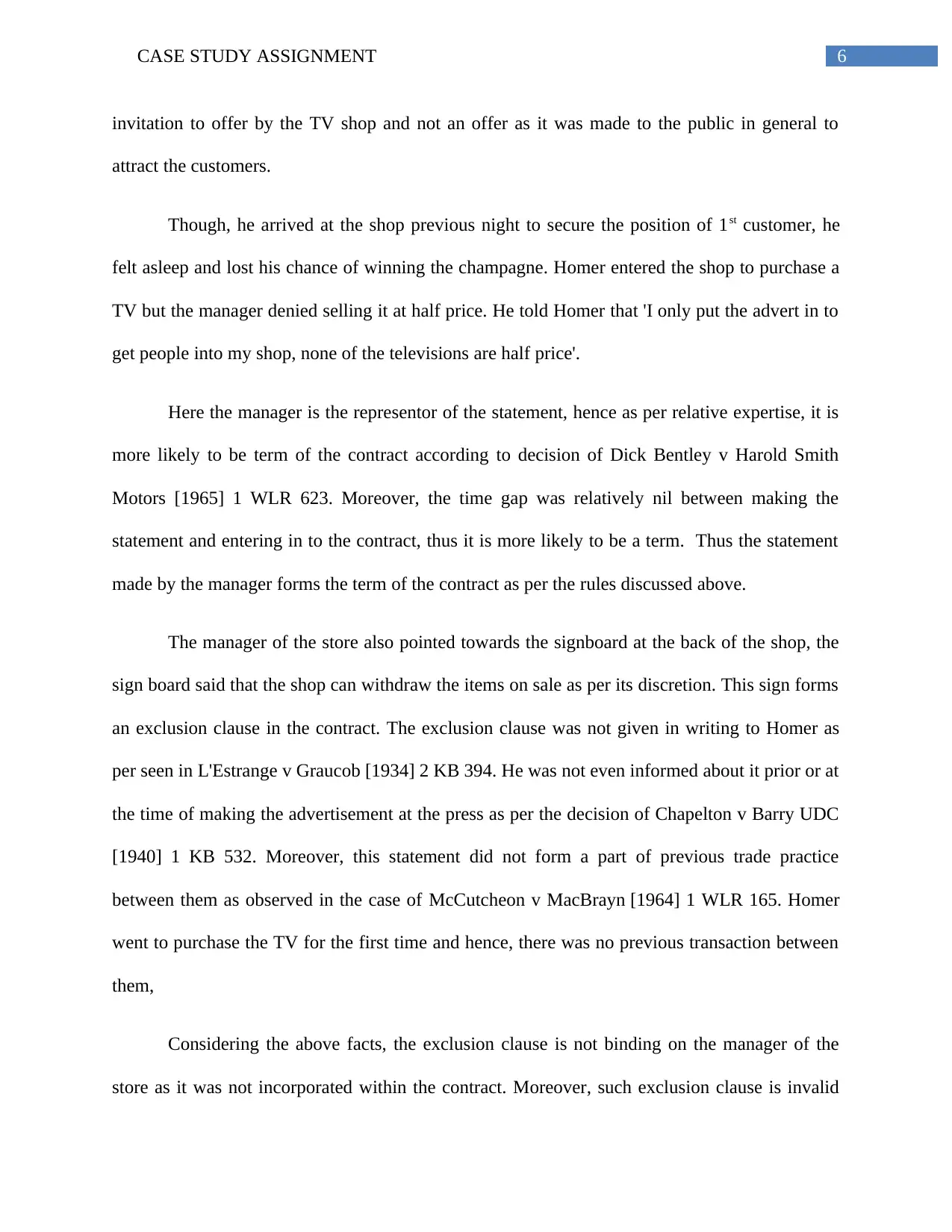
6CASE STUDY ASSIGNMENT
invitation to offer by the TV shop and not an offer as it was made to the public in general to
attract the customers.
Though, he arrived at the shop previous night to secure the position of 1st customer, he
felt asleep and lost his chance of winning the champagne. Homer entered the shop to purchase a
TV but the manager denied selling it at half price. He told Homer that 'I only put the advert in to
get people into my shop, none of the televisions are half price'.
Here the manager is the representor of the statement, hence as per relative expertise, it is
more likely to be term of the contract according to decision of Dick Bentley v Harold Smith
Motors [1965] 1 WLR 623. Moreover, the time gap was relatively nil between making the
statement and entering in to the contract, thus it is more likely to be a term. Thus the statement
made by the manager forms the term of the contract as per the rules discussed above.
The manager of the store also pointed towards the signboard at the back of the shop, the
sign board said that the shop can withdraw the items on sale as per its discretion. This sign forms
an exclusion clause in the contract. The exclusion clause was not given in writing to Homer as
per seen in L'Estrange v Graucob [1934] 2 KB 394. He was not even informed about it prior or at
the time of making the advertisement at the press as per the decision of Chapelton v Barry UDC
[1940] 1 KB 532. Moreover, this statement did not form a part of previous trade practice
between them as observed in the case of McCutcheon v MacBrayn [1964] 1 WLR 165. Homer
went to purchase the TV for the first time and hence, there was no previous transaction between
them,
Considering the above facts, the exclusion clause is not binding on the manager of the
store as it was not incorporated within the contract. Moreover, such exclusion clause is invalid
invitation to offer by the TV shop and not an offer as it was made to the public in general to
attract the customers.
Though, he arrived at the shop previous night to secure the position of 1st customer, he
felt asleep and lost his chance of winning the champagne. Homer entered the shop to purchase a
TV but the manager denied selling it at half price. He told Homer that 'I only put the advert in to
get people into my shop, none of the televisions are half price'.
Here the manager is the representor of the statement, hence as per relative expertise, it is
more likely to be term of the contract according to decision of Dick Bentley v Harold Smith
Motors [1965] 1 WLR 623. Moreover, the time gap was relatively nil between making the
statement and entering in to the contract, thus it is more likely to be a term. Thus the statement
made by the manager forms the term of the contract as per the rules discussed above.
The manager of the store also pointed towards the signboard at the back of the shop, the
sign board said that the shop can withdraw the items on sale as per its discretion. This sign forms
an exclusion clause in the contract. The exclusion clause was not given in writing to Homer as
per seen in L'Estrange v Graucob [1934] 2 KB 394. He was not even informed about it prior or at
the time of making the advertisement at the press as per the decision of Chapelton v Barry UDC
[1940] 1 KB 532. Moreover, this statement did not form a part of previous trade practice
between them as observed in the case of McCutcheon v MacBrayn [1964] 1 WLR 165. Homer
went to purchase the TV for the first time and hence, there was no previous transaction between
them,
Considering the above facts, the exclusion clause is not binding on the manager of the
store as it was not incorporated within the contract. Moreover, such exclusion clause is invalid
Paraphrase This Document
Need a fresh take? Get an instant paraphrase of this document with our AI Paraphraser
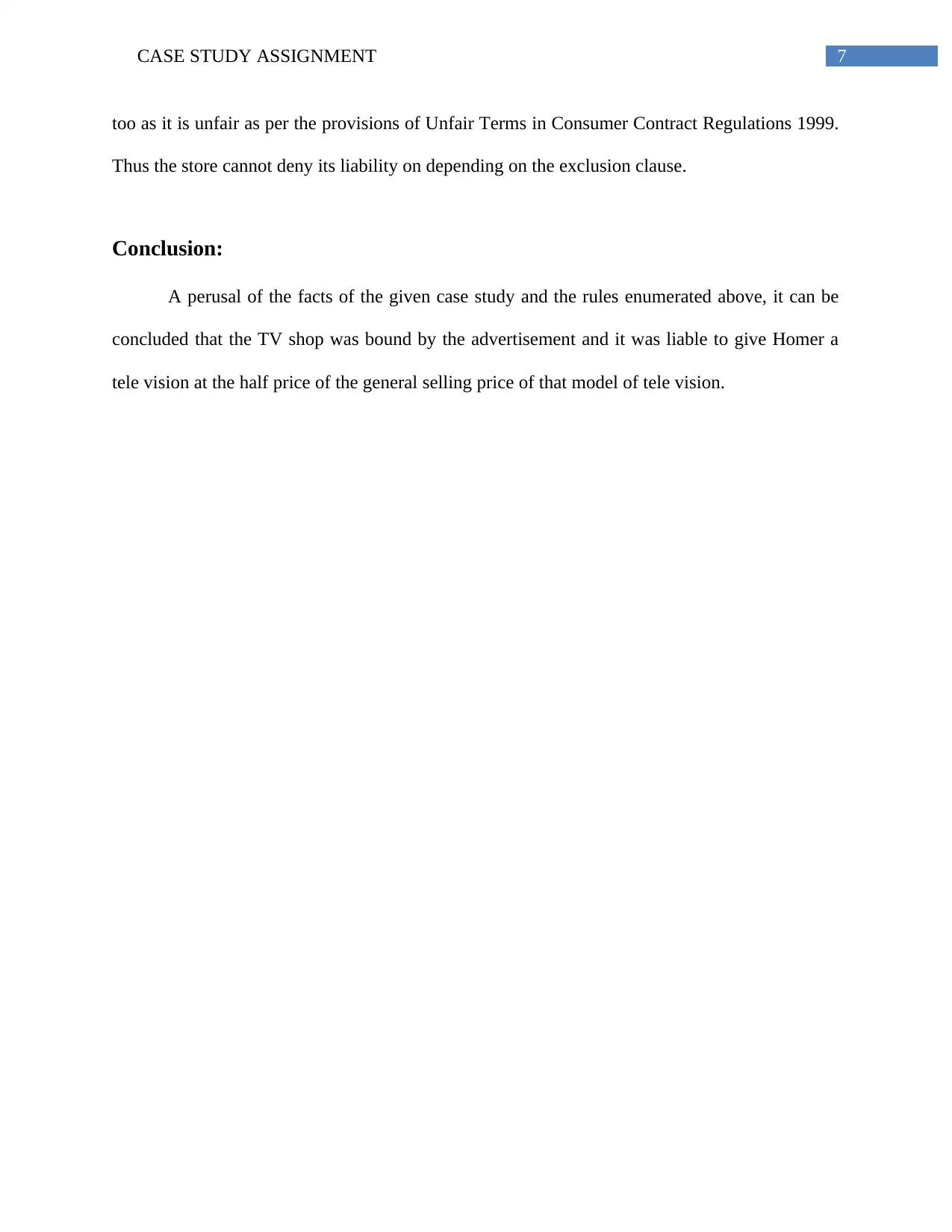
7CASE STUDY ASSIGNMENT
too as it is unfair as per the provisions of Unfair Terms in Consumer Contract Regulations 1999.
Thus the store cannot deny its liability on depending on the exclusion clause.
Conclusion:
A perusal of the facts of the given case study and the rules enumerated above, it can be
concluded that the TV shop was bound by the advertisement and it was liable to give Homer a
tele vision at the half price of the general selling price of that model of tele vision.
too as it is unfair as per the provisions of Unfair Terms in Consumer Contract Regulations 1999.
Thus the store cannot deny its liability on depending on the exclusion clause.
Conclusion:
A perusal of the facts of the given case study and the rules enumerated above, it can be
concluded that the TV shop was bound by the advertisement and it was liable to give Homer a
tele vision at the half price of the general selling price of that model of tele vision.
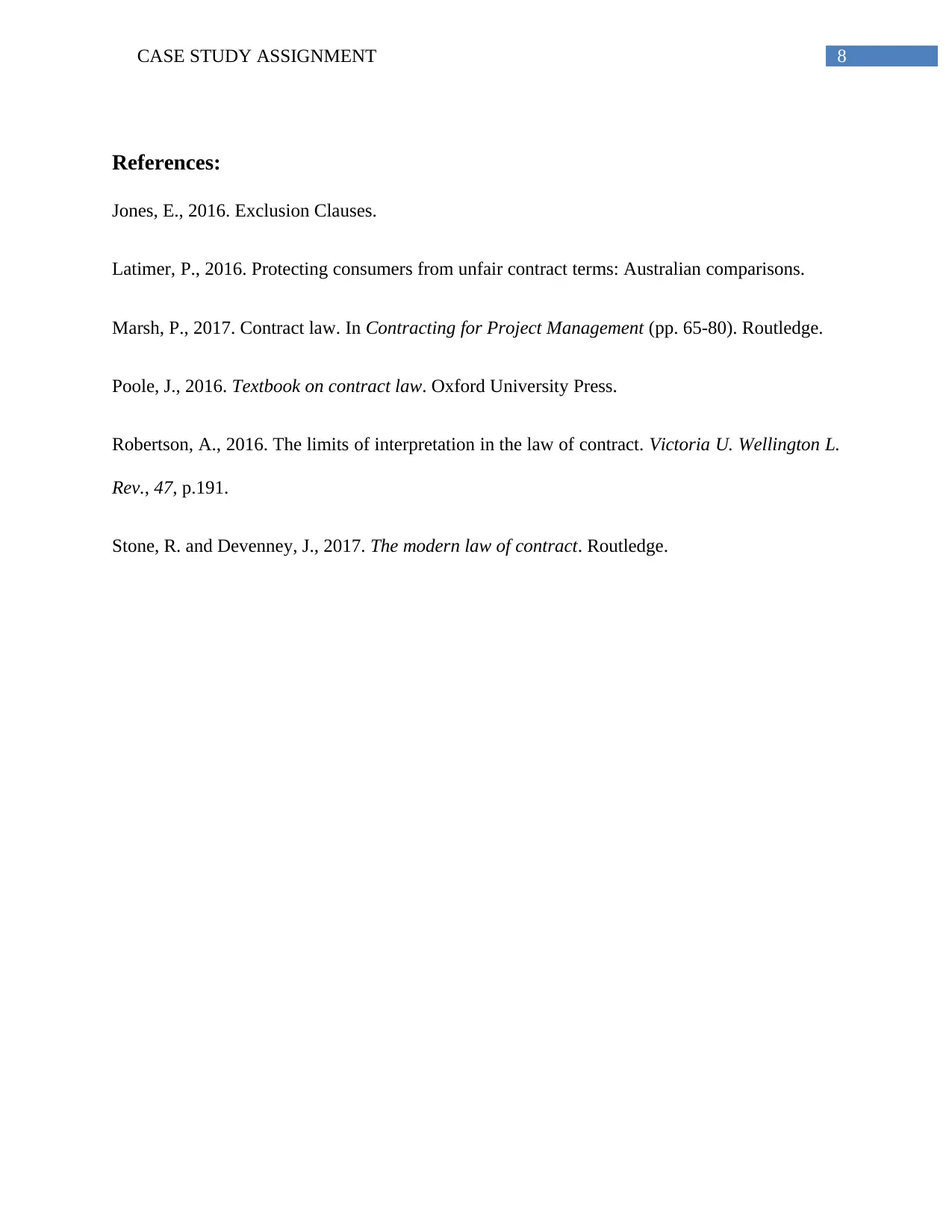
8CASE STUDY ASSIGNMENT
References:
Jones, E., 2016. Exclusion Clauses.
Latimer, P., 2016. Protecting consumers from unfair contract terms: Australian comparisons.
Marsh, P., 2017. Contract law. In Contracting for Project Management (pp. 65-80). Routledge.
Poole, J., 2016. Textbook on contract law. Oxford University Press.
Robertson, A., 2016. The limits of interpretation in the law of contract. Victoria U. Wellington L.
Rev., 47, p.191.
Stone, R. and Devenney, J., 2017. The modern law of contract. Routledge.
References:
Jones, E., 2016. Exclusion Clauses.
Latimer, P., 2016. Protecting consumers from unfair contract terms: Australian comparisons.
Marsh, P., 2017. Contract law. In Contracting for Project Management (pp. 65-80). Routledge.
Poole, J., 2016. Textbook on contract law. Oxford University Press.
Robertson, A., 2016. The limits of interpretation in the law of contract. Victoria U. Wellington L.
Rev., 47, p.191.
Stone, R. and Devenney, J., 2017. The modern law of contract. Routledge.
⊘ This is a preview!⊘
Do you want full access?
Subscribe today to unlock all pages.

Trusted by 1+ million students worldwide
1 out of 9
Related Documents
Your All-in-One AI-Powered Toolkit for Academic Success.
+13062052269
info@desklib.com
Available 24*7 on WhatsApp / Email
![[object Object]](/_next/static/media/star-bottom.7253800d.svg)
Unlock your academic potential
Copyright © 2020–2026 A2Z Services. All Rights Reserved. Developed and managed by ZUCOL.





